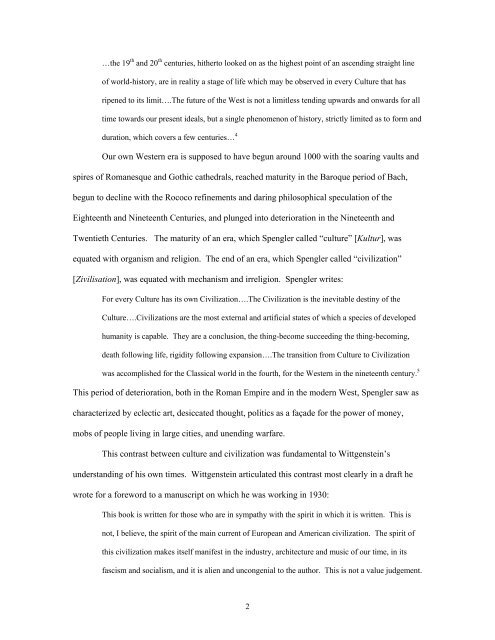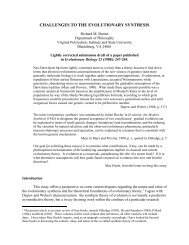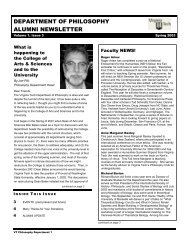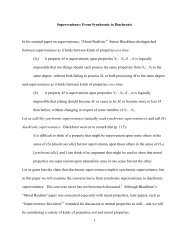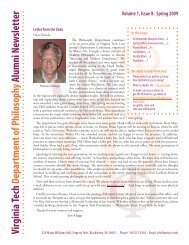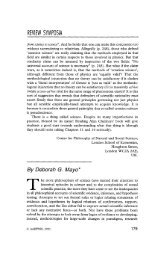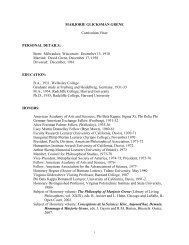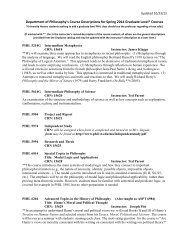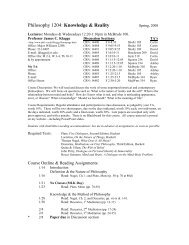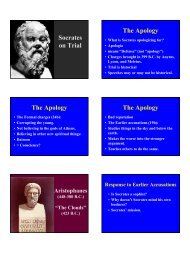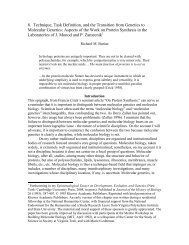Wittgenstein in Exile
Wittgenstein in Exile
Wittgenstein in Exile
You also want an ePaper? Increase the reach of your titles
YUMPU automatically turns print PDFs into web optimized ePapers that Google loves.
…the 19 th and 20 th centuries, hitherto looked on as the highest po<strong>in</strong>t of an ascend<strong>in</strong>g straight l<strong>in</strong>e<br />
of world-history, are <strong>in</strong> reality a stage of life which may be observed <strong>in</strong> every Culture that has<br />
ripened to its limit….The future of the West is not a limitless tend<strong>in</strong>g upwards and onwards for all<br />
time towards our present ideals, but a s<strong>in</strong>gle phenomenon of history, strictly limited as to form and<br />
duration, which covers a few centuries… 4<br />
Our own Western era is supposed to have begun around 1000 with the soar<strong>in</strong>g vaults and<br />
spires of Romanesque and Gothic cathedrals, reached maturity <strong>in</strong> the Baroque period of Bach,<br />
begun to decl<strong>in</strong>e with the Rococo ref<strong>in</strong>ements and dar<strong>in</strong>g philosophical speculation of the<br />
Eighteenth and N<strong>in</strong>eteenth Centuries, and plunged <strong>in</strong>to deterioration <strong>in</strong> the N<strong>in</strong>eteenth and<br />
Twentieth Centuries. The maturity of an era, which Spengler called “culture” [Kultur], was<br />
equated with organism and religion. The end of an era, which Spengler called “civilization”<br />
[Zivilisation], was equated with mechanism and irreligion. Spengler writes:<br />
For every Culture has its own Civilization….The Civilization is the <strong>in</strong>evitable dest<strong>in</strong>y of the<br />
Culture….Civilizations are the most external and artificial states of which a species of developed<br />
humanity is capable. They are a conclusion, the th<strong>in</strong>g-become succeed<strong>in</strong>g the th<strong>in</strong>g-becom<strong>in</strong>g,<br />
death follow<strong>in</strong>g life, rigidity follow<strong>in</strong>g expansion….The transition from Culture to Civilization<br />
was accomplished for the Classical world <strong>in</strong> the fourth, for the Western <strong>in</strong> the n<strong>in</strong>eteenth century. 5<br />
This period of deterioration, both <strong>in</strong> the Roman Empire and <strong>in</strong> the modern West, Spengler saw as<br />
characterized by eclectic art, desiccated thought, politics as a façade for the power of money,<br />
mobs of people liv<strong>in</strong>g <strong>in</strong> large cities, and unend<strong>in</strong>g warfare.<br />
This contrast between culture and civilization was fundamental to <strong>Wittgenste<strong>in</strong></strong>’s<br />
understand<strong>in</strong>g of his own times. <strong>Wittgenste<strong>in</strong></strong> articulated this contrast most clearly <strong>in</strong> a draft he<br />
wrote for a foreword to a manuscript on which he was work<strong>in</strong>g <strong>in</strong> 1930:<br />
This book is written for those who are <strong>in</strong> sympathy with the spirit <strong>in</strong> which it is written. This is<br />
not, I believe, the spirit of the ma<strong>in</strong> current of European and American civilization. The spirit of<br />
this civilization makes itself manifest <strong>in</strong> the <strong>in</strong>dustry, architecture and music of our time, <strong>in</strong> its<br />
fascism and socialism, and it is alien and uncongenial to the author. This is not a value judgement.<br />
2


